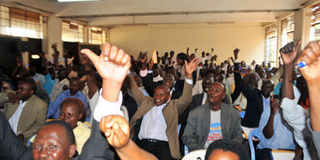Teachers’ agony is a pain of a nation desperate for deliverance

Teachers recently met at Bat Valley to forge a way forward.
Is Uganda a failed state or has it been failed?
In a Letter to the Editor sent this week, a reader cautioned striking teachers not to lose their ground to the government over their wage demands.
The reader, who put in a disclaimer that he is not a teacher, added that if teachers fail to cut their piece of the pie from the government now, then they will have themselves to blame for scavenging on peanuts.
Teachers, going by Uganda’s history, are not the type that have taken to the streets and held the government at ransom over ‘petty’ issues like pay or food, transport or housing. They go about their business with a kind of religious meekness that can only be fully understood by a monk.
Industrial action
So, when teachers, a few weeks back announced they were laying down their tools and tasting the waters with industrial action, I was personally taken by surprise. To have 35,000 teachers striking is not a healthy site for a government that just recently won a popular re-election with a sweeping percentage.
A few days ago in Jinja, President Museveni told teachers that the government had other priorities - roads, electricity, security, education, health centres - and as usual, the list is long mainly of items that ordinarily, form the basket of luxuries affordable by only a few rich Ugandans and a growing number of others living off bank credits. He told teachers that they are too many to deserve a salary raise because any such increment would tilt the economy dangerously.
Twenty five years ago, Mr Museveni held the Bible on his right hand and swore in as President for the first time to protect the Constitution of Uganda. He also promised, what at the time, was a tongue-twister for many Ugandans, to deliver “fundamental change”.
The NRM/A 10- Point Programme contained the key aspirations which the new government wanted to deliver to everyone’s door-step. Since then too, Mr Museveni has won four presidential elections, promising at each of them, that the country was on the brink of a “fundamental change”.
The question that arises now though is why, after hovering around for 25 years, is Mr Museveni suddenly facing a charged crowd of Ugandans, who say the President has delivered ‘wings of ants.’
Over the years, the economy has performed comparatively well - on the back of a huge goodwill private money flowing into the country. New sectors of telecoms, minerals, finance and insurance, manufacturing and others have given Uganda a semblance of a modern economy.
More children now go to school than they did 25 years ago, the greater north has been pacified ushering in hope for development. So, why would Ugandans be disgruntled with fundamental change being delivered?
With increasing poverty, most Ugandans are desperate to catch the disappearing tail of their dream lives. Opportunities get narrower by the day and in desperation, some are now taken to imitating their rich neighbours’ lives by living on bank credits – at least the honest ones.
Corruption disease
Corruption in Uganda has become a form of employment. Ugandans wake up every morning going out to work thinking of how much they will be able to make from sidekicks or deals. The decadence in government does not offer the promise of ‘the beautiful things are yet to come’ any more. Those who used to lie down like teachers, now realise that they can no longer do so.
It will not be long before somebody else asks for a salary increment, which in essence is a verdict on the failure of Mr Museveni’s promise of fundamental change to bring about the expected change where, among others, people do not have to scamper for newspapers looking for what odd jobs they can do.
A revolt by teachers is not like a revolt by taxi drivers. Many teachers feel their trust has been abused for too long, they represent the majority of Ugandans who feel that the State has been failed by its government not delivering fundamental change.




